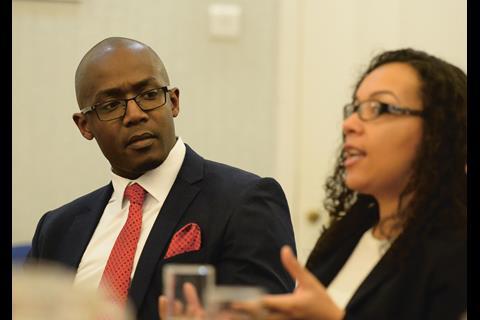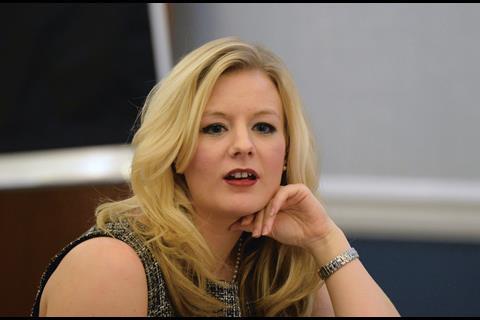Partnership is not necessarily the ultimate goal for a generation of junior lawyers turned off by stress, risk and internal politics. Eduardo Reyes reports from the latest Gazette roundtable.
This is how the cliched narrative goes for ‘generation Y’, those young people also known as ‘millennials’ – people born between 1980 and 2000. As well as being tech-savvy, they prefer flexible working because family life is a priority. They are good communicators. They are ambitious but want to be loved (though not by their boss).
Not for Gen-Y the deference-driven long hours of suckers born in the 1970s. Those deluded souls missed the point of life, neglecting their own creativity and chasing goals that did not deliver what they really needed. ‘Partnership’ in a professional services firm is a case in point – for a hefty proportion of Gen-Y lawyers, apparently, this is no longer the goal.
Those attending the Gazette’s roundtable for junior lawyers conform to the stereotype, at least to an extent. They are at the start of their careers, so their contributions have occasionally been anonymised below.
Commenting on the goal of partnership at a high street practice, one attendee says: ‘You look at the stress, you look at the personal risks, why would you do that anymore?’
On life in large commercial firms, another declares: ‘Why on earth would you want to be an equity partner in a huge firm, where you’ve got no control over the business, when you could move in-house, become a GC and be on the board of directors?
‘Why would you stay and be one of X number of partners? You’ve all got different rights to vote and you have to deal with all the internal politics. You’ve got all of this great business experience… you could go set up your own business.’
This attendee concludes: ‘Fewer people see partnership as where their career is going. It’s not [like] you qualify and think, “great, I’m going to keep working until I make partner, and then I’ve made it in life”. I don’t think that partnership is what everyone is aiming for now.’
The fact that traditional incentives no longer work as well as they did is also recognised by the leadership of firms where the lure of partnership is financially strong. ‘More senior members of the teams that I’ve worked in are increasingly aware that junior colleagues are having these doubts,’ the lawyer notes. Instead, they acknowledge, many junior lawyers do indeed think: ‘Actually, I have the skills to go out and make a successful career elsewhere.’
Says another: ‘They’ve not always gone to careers that would guarantee them a stable income. It can be something completely different. I think people are realising that the paths aren’t as clear-cut as they probably once were.’
Charlotte Pope-Williams, a barrister working in-house at the Bank of England, relates: ‘I have noticed, in relation to all of the legal services that we consume and interact with, partners [and senior management] are aware that younger people vote with their feet. If they don’t like it, they’ll just stop and do something else.’ She notes how increased prominence has been given to mentoring schemes and other types of career support.
Today’s lawyers, Baker & McKenzie solicitor Max Harris notes, are not just more willing but also more able to leave the law: ‘The growth of technology means lawyers are playing a role which is more commercial and therefore developing skills which will easily go into other professions or other jobs.’
One must also interpret changing aspirations in a broader societal and economic context. For those present and their peers, choices are often heavily circumscribed by debt and uncertain prospects. A reordering of priorities is understandable. Louisa Nye, chair of the Bar Council’s Young Barristers Committee, notes that this is especially true at entry level. On access to the profession, she notes: ‘From the barristers’ perspective, it’s less about qualifications or learning institutions, and more that your socio-economic background may mean you can’t actually get through the door.’
The Bar Professional Training Course costs up to £17,000, she notes, ‘which is just ridiculous for a one-year course. Expecting students to come out of university with huge amounts of debt, and then pay more on top of that – plus the cost of living – is just obscene’. She adds: ‘There’s a danger that we’re going back to a time when [the bar is] the preserve of the privileged.’
Of course, alternative routes to qualification have evolved which purport to be more inclusive. But Law Society Council member Beth Forrester, who works for Ofsted, observes: ‘Many in the profession don’t view those who come through CILEx or an apprenticeship as being at the same level. If you want to reach certain points in the profession, your options are still limited.’
‘It’s difficult getting in with an alternative route to qualification,’ paralegal Lami Jinadu confirms. ‘And trying to bridge that gap now is the task.’
Time spent working as a paralegal while seeking a training contract has, for many, increased sharply. Matthew Allan, paralegal at London firm Anthony Gold and Law Society Council member for LPC students, has been a paralegal for four years: ‘I started paralegalling when I began doing the GDL and I did that part-time,’ he says. ‘Then I started the LPC, which I was also doing part-time, and I’ve almost finished now.’
When applying for training contracts, Allan has come up against the legal profession’s heavy dependence on A-level grades for shortlisting candidates. ‘My A-levels were not sterling,’ Allan notes. ‘At the age of 29, I’m finding that this is a stumbling block for me even to get through the sifting stages of training contract applications.’
In common with several others present, Allan questions the weight accorded to ‘early qualifications’ above more recent achievements. Adele Edwin-Lamerton, solicitor at Camden-based JFH Law, observes: ‘The Big Four accountants have the same issue and they’ve found a way around using A-level grades. They’ve devised their own aptitude test so people can say, “Do you know what? When I was eighteen, it wasn’t a priority for me, but I do have the ability to pass the same tests, or demonstrate the same intellectual merit as other candidates”.’
Jaya Louvre, recruitment manager at Withers, believes the legal profession is ‘missing out on a huge raft of talent’, including people who struggle to meet the cost of education at university or law school. The international firm is one of the first to introduce an apprenticeship option, with three apprentices currently working in different departments of the London office. Louvre is now trying to encourage other firms in the City to promote the adoption of the apprentice route, with the government-supported Trailblazer programme set to launch in September.
The so-called ‘paralegalisation’ trend also reflects underlying shifts in the market for advice. Oliver Carter, trainee solicitor at Irwin Mitchell and co-chair of Young Legal Aid Lawyers, explains: ‘The problem is possibly more prevalent in legal aid, where the profit margins for firms are increasingly squeezed. They see that as a way of remaining profitable by delegating more work to paralegals.’
Feedback from YLAL members, he adds, indicates that ‘being a paralegal is increasingly a prerequisite to getting a training contract and progressing your career’. In some cases there is yet one more layer to negotiate, with aspiring lawyers expected to take an admin post as a route to securing a paralegal job. A firm may then decide to recruit trainees only from its paralegal ‘pool’.
‘There’s no promise of a training contract,’ he notes, ‘but it’s a paralegal job and [so] they’ll consider you for a training contract.’
At the table
Eduardo Reyes, Law Society Gazette; Jonathan Achampong, Wedlake Bell; Adele Edwin-Lamerton, JFH Law; Tamasin Dorosti, Vodafone; Beth Forrester, Ofsted; Matthew Allan, Anthony Gold; Jaya Louvre, Withers; Matthew Short, Allen & Overy; Lami Jinadu, Willis Towers Watson; Charlotte Pope-Williams, Bank of England; Louisa Nye, Landmark Chambers; Ben Seifert, Drystone Chambers; Max Harris, Baker & McKenzie; Oliver Carter, Irwin Mitchell; Leanne Maund, Eversheds
(Attendees were speaking in a personal capacity or as members of professional body committees)
At the bar too, entire practice areas have been heavily affected by cuts in public funding. ‘I think there’s a lot of fear about the future,’ Drystone Chambers barrister Ben Seifert says. ‘How can we be certain that we will be able to practise in our areas of law, specifically legal aid? It could just disappear completely.’
Carter adds: ‘In terms of the careers of lawyers in legal aid, particularly junior lawyers, the aspiration at the moment is limited to being able to survive and sustain a career in that area of law. The pressures of legal aid cuts have meant that people are leaving the profession entirely, and moving in-house or to charities and NGOs.’
Another concern, Nye notes, is Briggs LJ’s review of the civil courts (see p8), which proposes an online system to deal with cases valued at under £25,000. ‘It’s effectively going to cut off all work for junior barristers under a certain level of call in civil work,’ she says. ‘You need the career progression at the early stages to get to a place where you can do the more complicated cases.’ Solicitor-advocates and in-house lawyers who currently handle their own advocacy are similarly affected, she notes.
In family law too, Nye adds, removal of early opportunities to develop a practice is causing problems: ‘Talented people are leaving the bar in droves, because they just can’t make the choices in relation to their life, let alone their career, that they should be entitled to make.’
Mentoring has a role to play when career paths are so uncertain, but opinion is divided on how it is best deployed. Forrester says: ‘I don’t think organised mentoring always works, because you can’t match someone on paper and know that the relationship will work. Perhaps the best mentors are those who develop naturally.’
Leanne Maund, chair of the Law Society’s Junior Lawyers Division, observes that ‘firms are waking up’ to the need to say to junior lawyers: ‘We’re going to invest in you to try and make you stay’. But she makes a similar point in describing a scenario where ‘a junior solicitor has been allocated a mentor in another office, and that person is obligated to arrange a meeting once every three months – which means that no one within the team bothers to mentor unofficially’.
She adds: ‘The best mentors you wouldn’t actually call mentors. They’re just the people in your team that have taken the time to train you and help you in your professional development. In some ways it can be a negative when firms say, “we’ve got this amazing mentoring scheme”.’
What a good mentor can best deliver will vary according to career stage, says Tamasin Dorosti, a paralegal at Vodafone who begins a training contract in September: ‘When I’m looking for training contracts, I want my mentor to help me look at my applications, consider the feedback I get and be proactive. On the other hand, when I’m going to make the transition from paralegalling in-house to training in private practice, I want that person to be there just to listen to my experiences.’
She adds: ‘It might be a challenging transition to make, and having someone that can provide insight from both sides of the fence is helpful.’
Pope-Williams, who mentors five people, says: ‘There’s no point in me sitting there giving them warm words. I try and harness my network to their benefit.’
The traditional culture of support evident in the chambers model has much to recommend it, Nye reflects: ‘The great thing about being in chambers is you get that collegiality, which is possibly why formal mentoring hasn’t happened. I know the people who I’ll visit down the corridor and say, “I’ve got this really difficult ethical problem. I’ve got this really difficult legal problem,” or, “I simply don’t know, am I supposed to be wearing my wig and gown today?” Maybe it’s something that the bar, or at least the self-employed bar, has enjoyed that the solicitor profession has lacked. That’s why we bother to be in chambers, for the most part.’
By contrast, Edwin-Lamerton notes: ‘When you do a training contract, you’re someone else’s responsibility at at least four different times. And even though you have a nominated supervisor, that person might not be the one who actually gives you any work or knows your name, or who passes you in the corridor.’ An effective mentor is therefore more likely to come from outside the department, whereas, she adds, ‘the modern training regime for solicitors does lend itself to a more artificial method of mentoring’.
Matthew Short, a trainee at Allen & Overy, says: ‘You can be very fortunate and strike up relationships with people at different levels above you.’ Short’s method, which he ‘used to refer to jokingly as stress-testing’, involves scoping colleagues out who appreciate that, as a junior member of the team, it’s helpful to be able to test your understanding before feeding in to more senior members.
The discussion then turns to a subject which generates the most heat of all: the Solicitor Regulation Authority’s proposals for a Solicitors Qualifying Examination (SQE). Forrester, who has attended meetings with the SRA on the proposal, describes what is on the table: ‘The idea is that you would do a series of knowledge exams as part one, then some sort of experience in a law firm, and then a practical set of exams as part two – stuff that you do on the LPC such as interviewing and advising, but at a graduate level, allegedly tougher than the current LPC. The SRA may or may not assess your practical training part.’
Allan sees the proposal as deeply flawed: ‘The plan currently being consulted upon could potentially deliver a major blow to equality and diversity. There are so many unknowns with regard to cost and time commitments, and the knock-on effects they will have for people from more disadvantaged backgrounds.’ That is especially so ‘with fewer firms taking a punt on students and providing them with training contracts before they have the requisite qualifications’.
It is also noted that the proposal is badly timed in terms of course design at academic institutions. Maund says universities are ‘really concerned about the fact that it might change your ability to choose later on whether or not you want to be a barrister or a solicitor’, because the bar would not recognise some aspects of the route to qualification. ‘Unless you’ve got the money, why would you pay to do a law degree that’s just a law degree, if it’s not a law degree that gets you to passing your knowledge-based exams?’ she asks.
She also questions whether SQE will make a less costly route to qualification possible. ‘The JLD’s position is that it doesn’t remove the requirement for the LPC at all. What will happen is that LPC providers will say: “We’ve developed this new course. It’s called the Solicitors Qualifying Exam Preparatory Course, and it’s £12,000, and you need a law degree or a GDL to do it, and then you also have to pay for the exam”.’
If the LPC is no longer a requirement to qualify, it is noted, paying for study becomes even more of a problem. One attendee says: ‘Some financial institutions have said it wouldn’t fall under professional studies loan requirements. So you’d [have to] take out a regular commercial loan and start repaying it immediately.’ Maund responds: ‘We’ve tried and tried to get the SRA to understand this, and the response was… “Well, you can just get a job and save, and then pay for it”.’
Short reflects: ‘I think that’s a big thing, because I wouldn’t be a trainee solicitor now if I hadn’t been lucky enough to secure a training contract where I received financial support. It just would not have been feasible.’
In closing, those present are asked to consider whether they are happy being lawyers. After all, as previously noted, this is a generation more likely than its predecessors to vote with its feet.
Barrister Seifert replies: ‘A lot of the people I speak to are really, really happy to be barristers. I feel really lucky… but we do [feel] constant paranoia. You’re only as good as your last brief. You don’t know whether you’re going to continue. You look at your diary, and you think, “Oh, that’s a bit thin”. There’s that balance of freedom, as a barrister – freedom and enjoying your work – and concern about the future.’
‘I love my job,’ Maund says, but adds: ‘When you actually get into firms, I don’t think the majority absolutely love being a lawyer and are proud to be a lawyer. I am.’
- Our thanks to the Junior Lawyers Division and the Young Barristers Committee for their help in organising this roundtable



































No comments yet